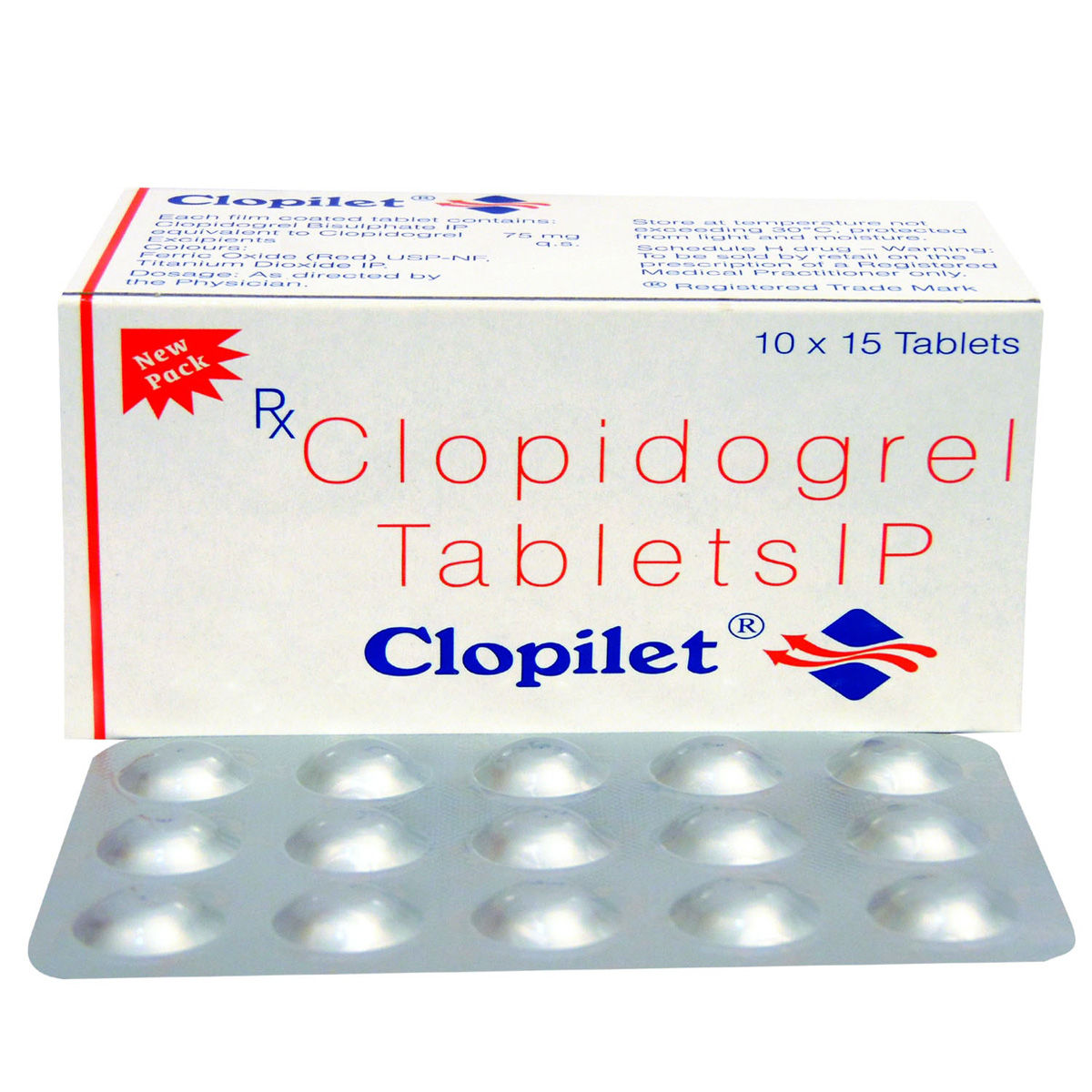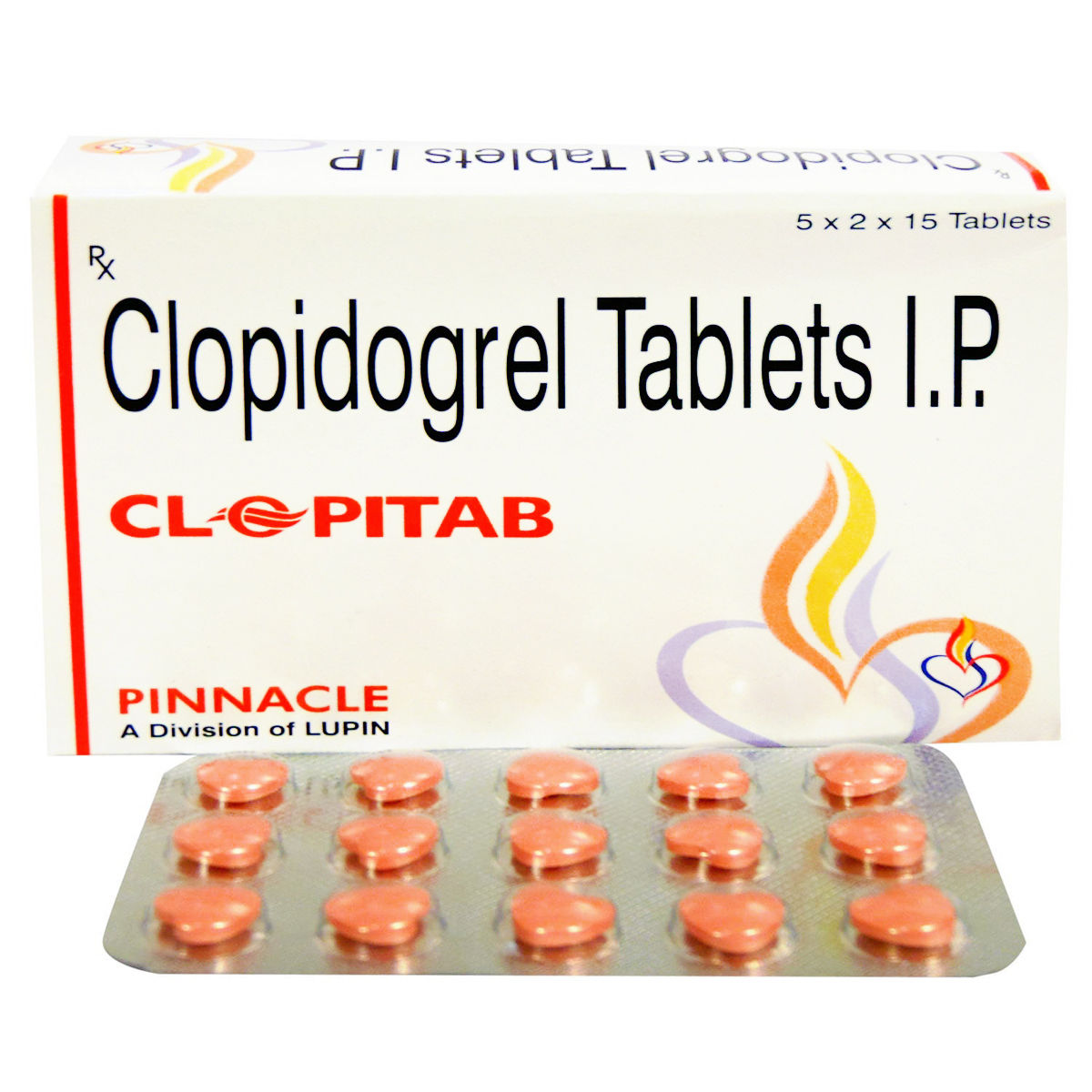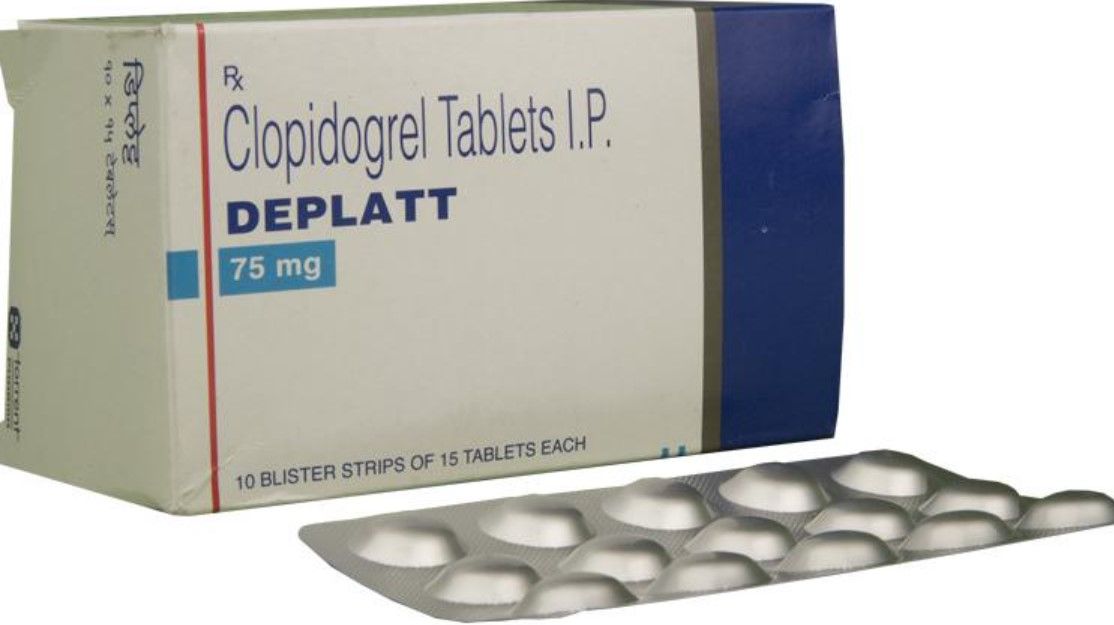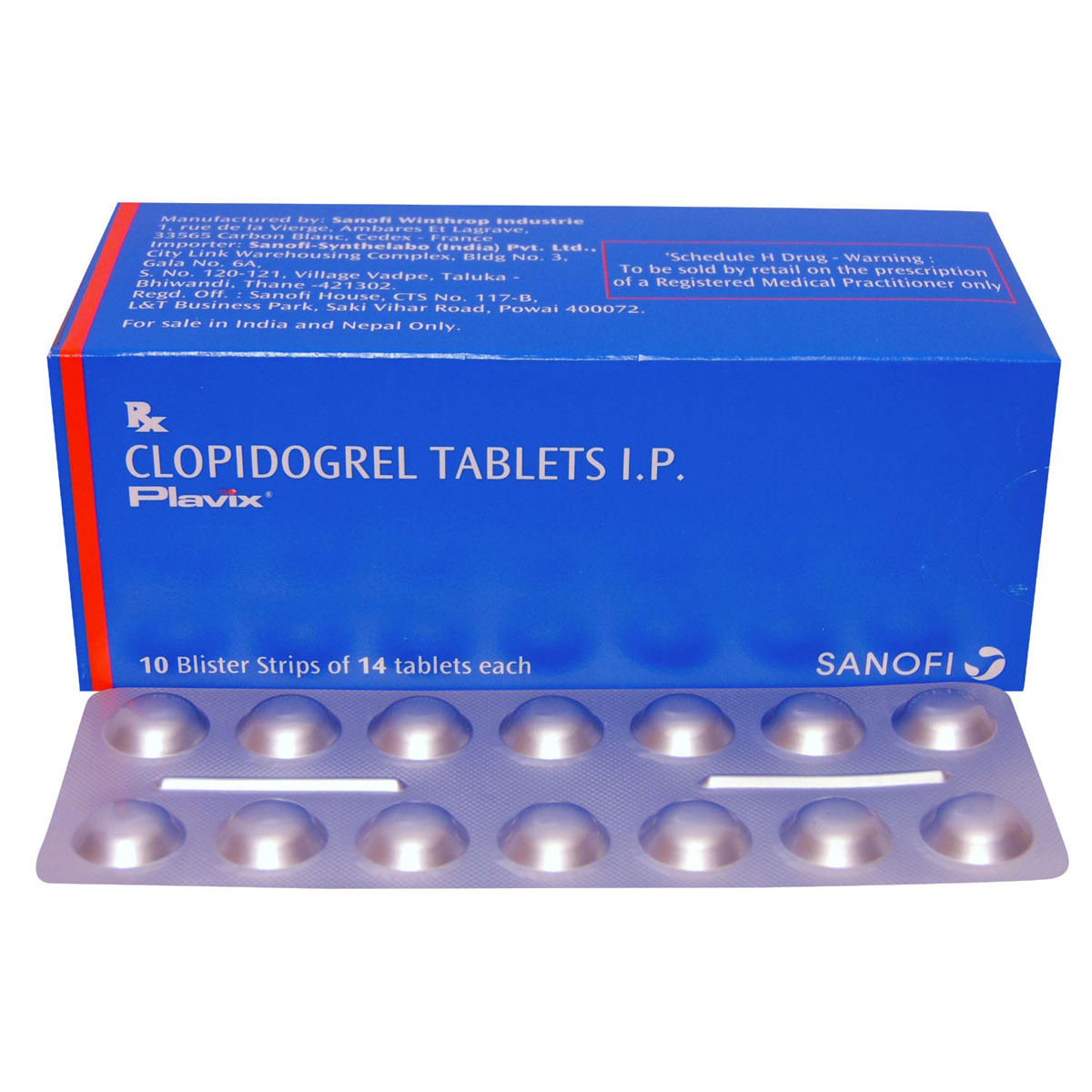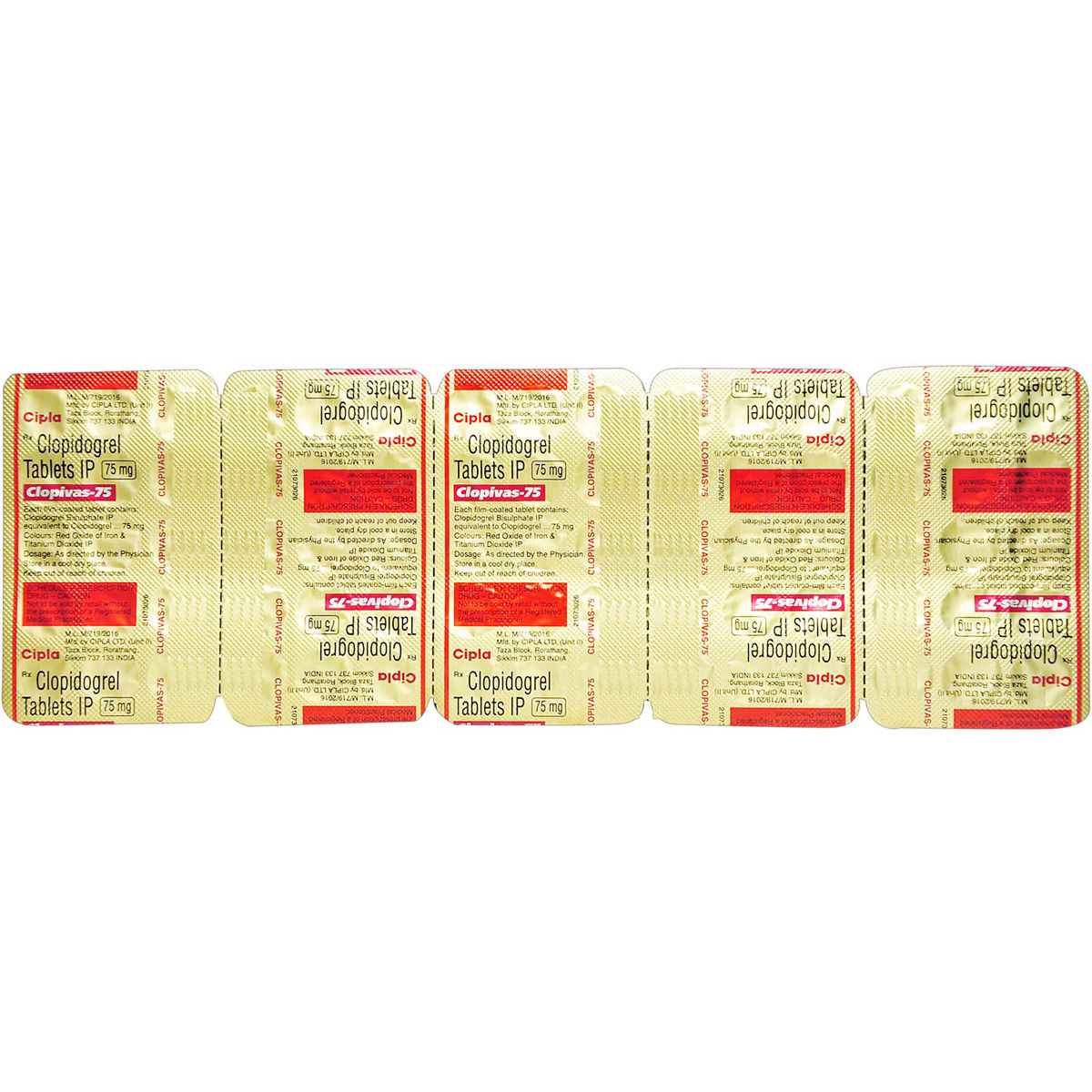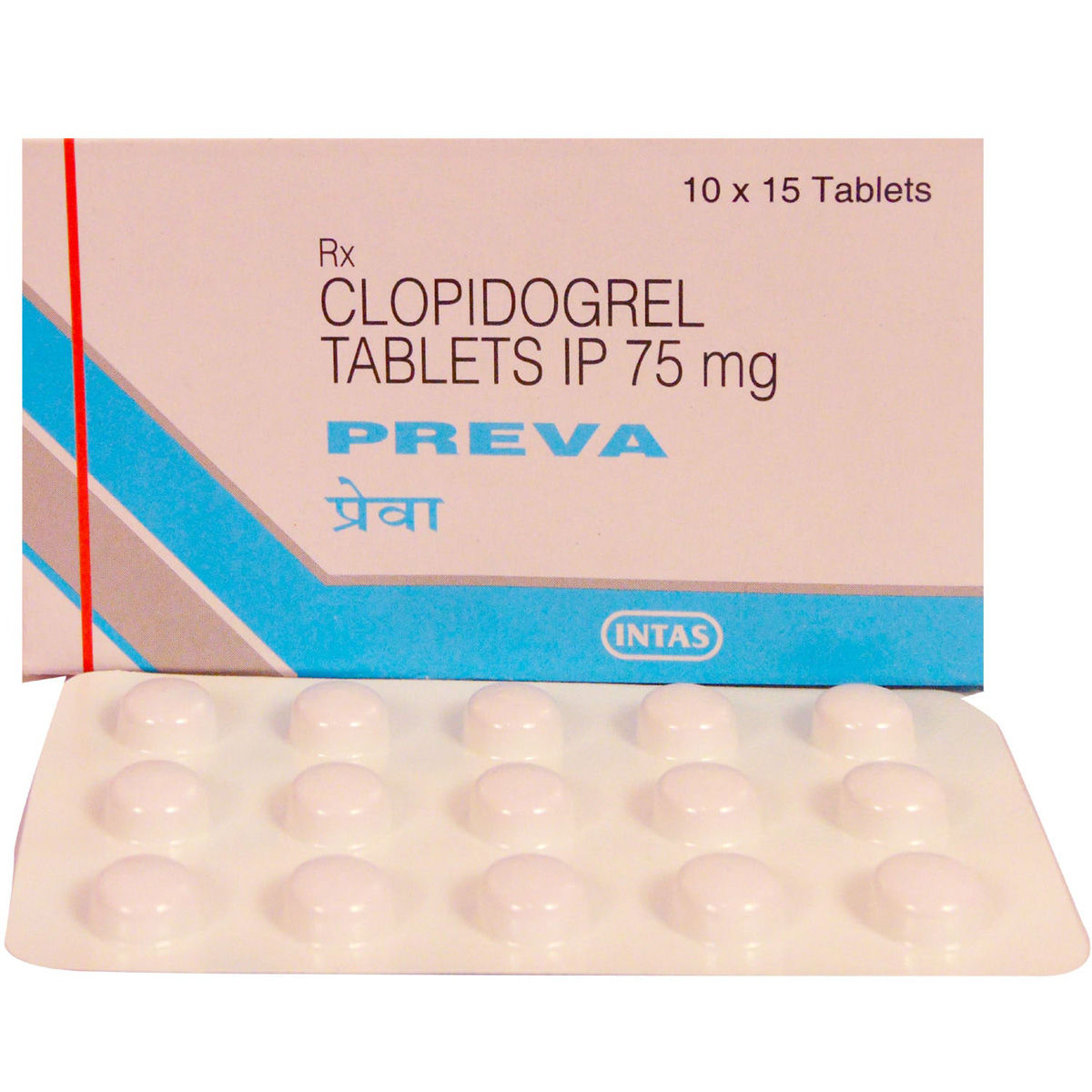Clavix Tablet 15's
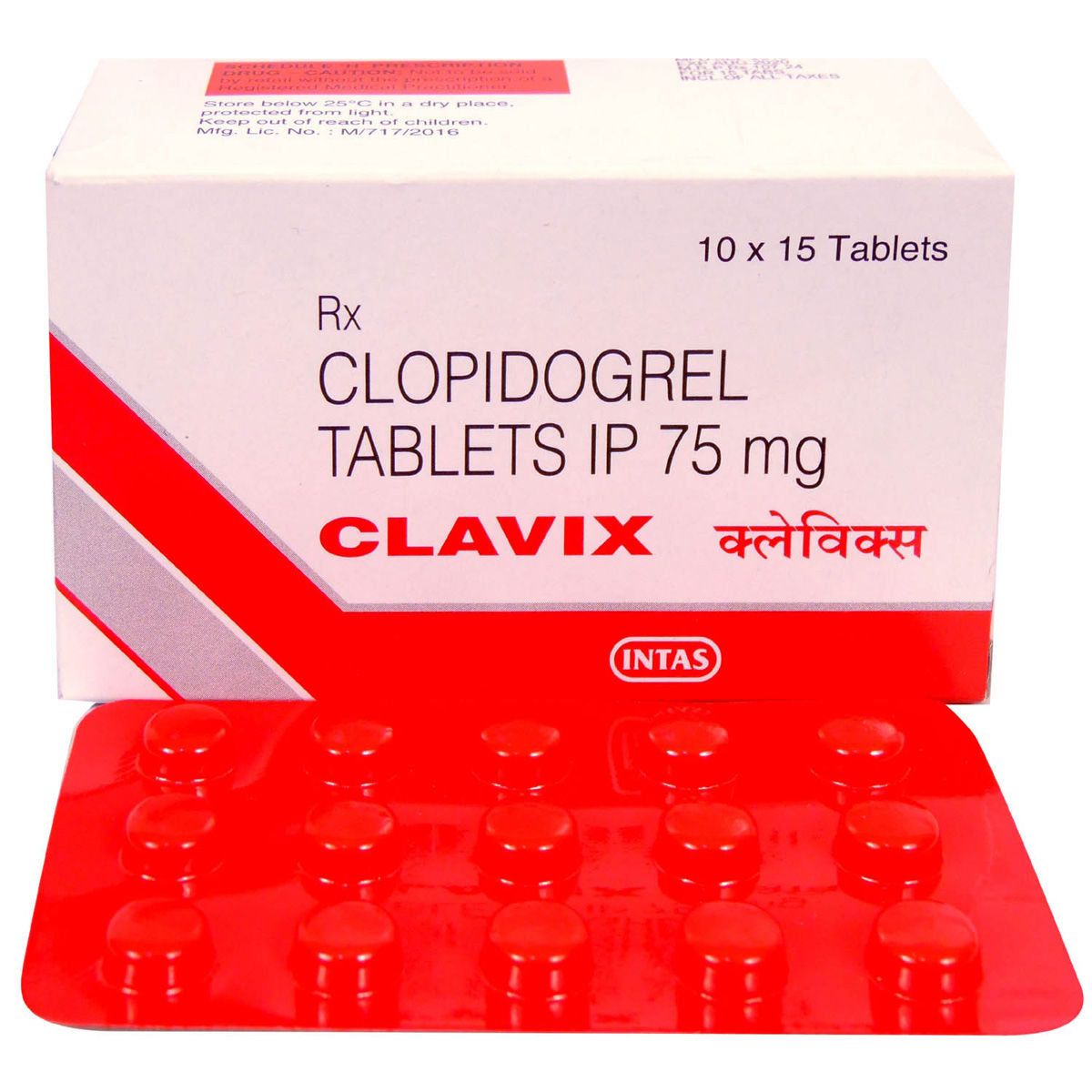
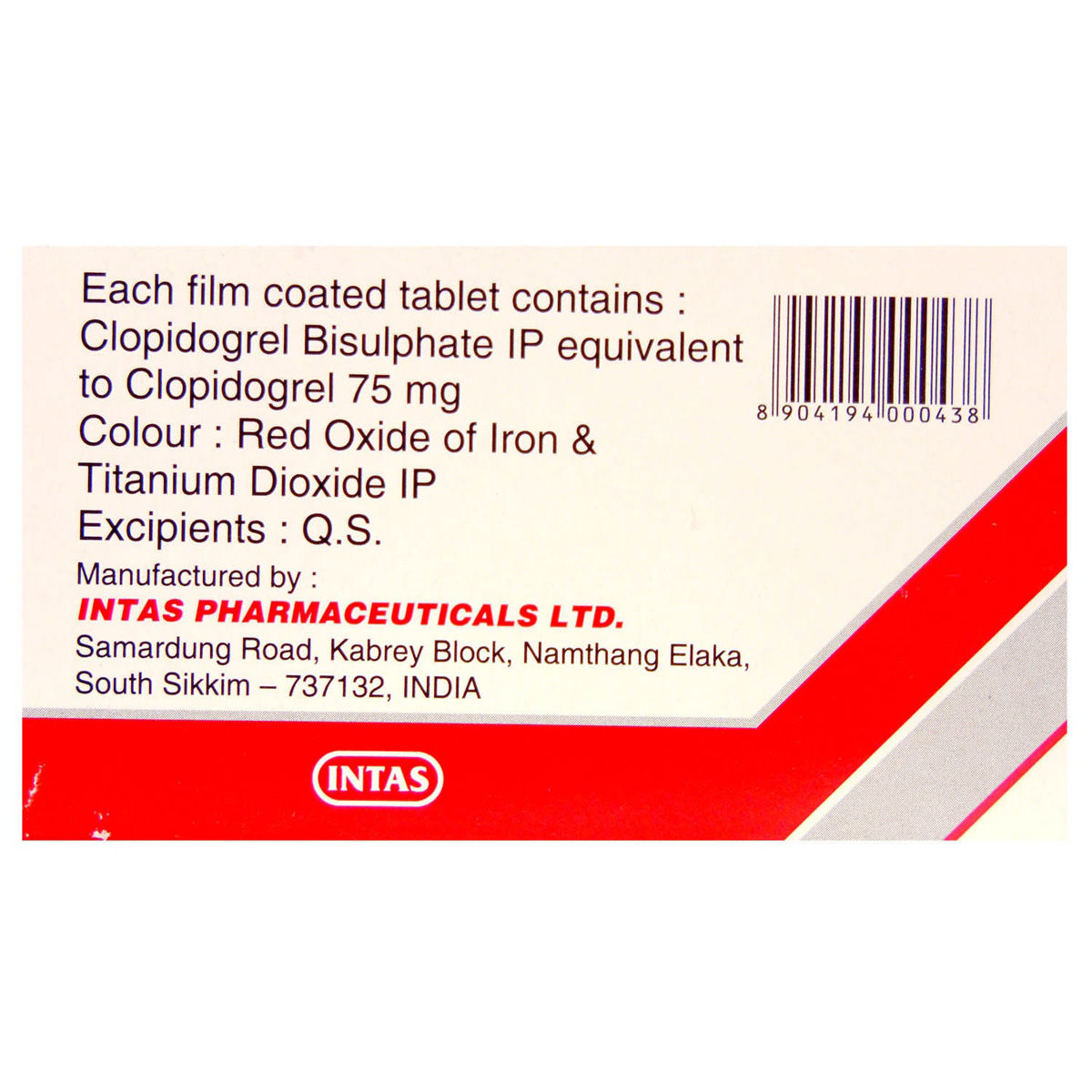


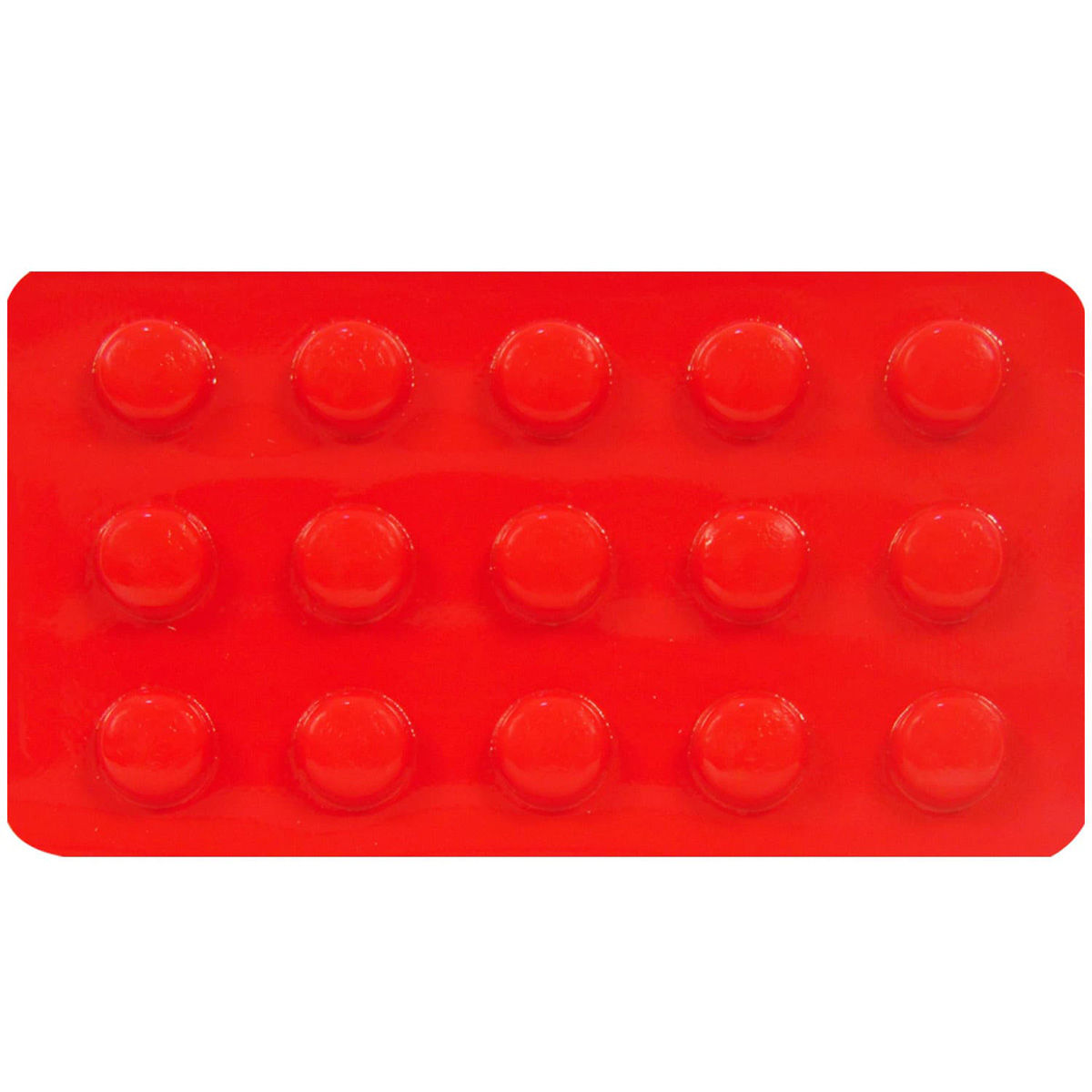
₹111.5
(Inclusive of all Taxes)
₹16.7 Cashback (15%)
Clavix Tablet is used for the prevention of heart attack or stroke in people at high risk of heart disease. It contains Clopidogrel, which helps in preventing the formation of harmful blood clots (plaque) in your veins. It makes your blood flow easily through your veins, making it less likely to form a serious blood clot. So, it helps prevent blood clots if you have an increased risk of having severe chest pain (unstable angina or heart attack), stroke, or peripheral arterial disease (heart problem due to narrowed blood vessels). In some cases, you may experience side effects such as nosebleeds, heavier periods, bleeding gums, easy bruising, diarrhoea, stomach pain, indigestion, or heartburn. Before taking this medicine, you should tell your doctor if you are allergic to any of its components or if you are pregnant/breastfeeding, and about all the medications you are taking and pre-existing medical conditions.
Know Your Delivery Time
Provide Delivery Location
 Prescription drug
Prescription drugWhats That

Secure Payment

India's Most Trusted Pharmacy

Genuine Products
Composition :
Manufacturer/Marketer :
Consume Type :
Return Policy :
Expires on or after :
NPPA :
About Clavix Tablet
Clavix Tablet is used for the prevention of heart attack or stroke in people at high risk of heart disease. A heart attack generally refers to the blocked flow of blood to the heart because of the blockage of arteries.
Clavix Tablet contains clopidogrel, which works by preventing the formation of harmful blood clots (plaque) in your veins. It makes your blood flow easily through your veins, making it less likely to form a serious blood clot.
In some cases, you may experience nosebleeds, heavier periods, bleeding gums, easy bruising, diarrhoea, stomach pain, indigestion, or heartburn. If the side effects are persistent, reach out to your doctor.
Clavix Tablet should be taken orally with or without food. It should be swallowed whole with a glass of water. Do not chew, bite or break it. Your doctor will advise you how often you take the medicine based on your medical condition.
Avoid taking Clavix Tablet if you are allergic to it. Let your doctor know if you have any liver, kidney, or heart problems. Clavix Tablet should be taken cautiously in pregnant or breastfeeding women. Do not take Clavix Tablet with aspirin or ibuprofen for pain relief while you are using Clavix Tablet . It may increase the chance of having stomach ulcers or severe gastric bleeding.
Uses of Clavix Tablet
Clavix Tablet used for the prevention of heart attack, Prevention of stroke, and Prevention of heart-related chest pain (angina). The detailed uses of Clavix Tablet are as follows:<br/>
- Prevention of Heart Attack: Clavix Tablet helps to prevent blood clots that can cause heart attacks by inhibiting platelet aggregation.<br/>
- Prevention of Stroke: Clavix Tablet reduces the risk of stroke by preventing blood clots that can block blood flow to the brain.<br/>
- Prevention of Heart-Related Chest Pain (Angina): Clavix Tablet improves blood flow to the heart, reducing the risk of chest pain (angina) caused by reduced blood flow.<br/>
- Management of Acute Coronary Syndrome: Clavix Tablet manages conditions like unstable angina and myocardial infarction (heart attack) by preventing clot formation.<br/>
- Peripheral Arterial Disease: Clavix Tablet reduces the risk of clot formation in peripheral arteries, improving blood flow to limbs.<br/>
Directions for Use
• Clavix Tablet can be taken with or without food. However, if it causes stomach upset, take it with food. • It is usually taken once daily at the same time each day or as prescribed by your doctor. • Swallow Clavix Tablet as a whole with a glass of water. • Do not crush, chew, or break it.
Medicinal Benefits
- Clavix Tablet plays a vital role in preventing the formation of harmful blood clots in your blood vessels by making platelets (clotting agents) stick together.
- It helps to reduce the risk of heart attack, stroke, unstable angina (heart-related chest pain), and peripheral arterial disease (blocked or poor blood flow due to narrowed blood vessels) in heart disease patients and patients who have undergone recent heart surgery with a stent.
How Clavix Tablet Works
Storage
- Drink water or other clear fluids.
- To prevent worsening of pain, limit intake of tea, coffee, or alcohol.
- Include bland foods like rice, toast, crackers, and rice in your diet.
- Avoid lying down immediately after eating as it may cause indigestion or heartburn.
- Avoid acidic and spicy food as it may cause indigestion.
- Take medications with food (if recommended): It can help prevent stomach distress and indigestion.
- Eat smaller, more frequent meals: Divide daily food intake into smaller, more frequent meals to ease digestion.
- Avoid trigger foods: Identify and avoid foods that trigger indigestion, such as spicy, fatty, or acidic foods.
- Stay upright after eating: Sit or stand upright for at least 1-2 hours after eating to prevent stomach acid from flowing into the oesophagus.
- Avoid carbonated drinks: Avoid drinking carbonated beverages, such as soda or beer, which can worsen indigestion.
- Manage stress: To alleviate indigestion, engage in stress-reducing activities like deep breathing exercises or meditation.
- Consult a doctor if needed: If indigestion worsens or persists, consult a healthcare professional to adjust the medication regimen or explore alternative treatments.
- Inform Your Doctor: Notify your doctor immediately about your diarrhoea symptoms. This allows them to adjust your medication or provide guidance on managing side effects.
- Stay Hydrated: Drink plenty of fluids to replace lost water and electrolytes. Choose water, clear broth, and electrolyte-rich drinks. Avoid carbonated or caffeinated beverages to effectively rehydrate your body.
- Follow a Bland Diet: Eat easy-to-digest foods to help firm up your stool and settle your stomach. Try incorporating bananas, rice, applesauce, toast, plain crackers, and boiled vegetables into your diet.
- Avoid Trigger Foods: Steer clear of foods that can worsen diarrhoea, such as spicy, fatty, or greasy foods, high-fibre foods, and dairy products (especially if you're lactose intolerant).
- Practice Good Hygiene: Maintain good hygiene to prevent the spread of infection. To stay healthy, wash your hands frequently, clean and disinfect surfaces regularly, and avoid exchanging personal belongings with others.
- Take Anti-Diarrheal Medications: If your doctor advises, anti-diarrheal medications such as loperamide might help manage diarrhoea symptoms. Always follow your doctor's directions.
- Keep track of your diarrhoea symptoms. If they don't get better or worse or are accompanied by severe stomach pain, blood, or dehydration signs (like extreme thirst or dark urine), seek medical help.
- Inform your doctor about the nausea and discuss possible alternatives to the medication or adjustments to the dosage.
- Divide your daily food intake into smaller, more frequent meals to reduce nausea.
- Opt for bland, easily digestible foods like crackers, toast, plain rice, bananas, and applesauce.
- Avoid certain foods that can trigger nausea, such as fatty, greasy, spicy, and smelly foods.
- Drink plenty of fluids, such as water, clear broth, or electrolyte-rich beverages like coconut water or sports drinks.
- Use ginger (tea, ale, or candies) to help relieve nausea.
- Get adequate rest and also avoid strenuous activities that can worsen nausea.
- Talk to your doctor about taking anti-nausea medication if your nausea is severe.
- Record when your nausea occurs, what triggers it, and what provides relief to help you identify patterns and manage your symptoms more effectively.
- Chest pain may last for a while and needs immediate medical attention as it is a significant health issue to be attended to.
- Take rest and refrain from doing physical activity for a while, and restart after a few days.
- Try applying an ice pack to the strained area for at least 20 minutes thrice a day. Ice pack thus helps reduce inflammation.
- Sit upright and maintain proper posture if there is persistent chest pain. • Use extra pillows to elevate your position and prop your chest up while sleeping.
What if I have taken an overdose of Clavix Tablet
Drug Warnings
- Avoid taking Clavix Tablet if you are allergic to it.
- Indigestion medicines known as proton pump inhibitors, like omeprazole, should be used with caution while taking Clavix Tablet .
- Prolonged use of Clavix Tablet can cause bleeding problems (like nosebleeds, heavier periods, bleeding gums, and easy bruising).
- If you are going to have any surgery, discontinue taking Clavix Tablet 5 days before the surgery.
- Sudden discontinuation of Clavix Tablet might increase the risk of heart attack, stroke, and other cardiovascular events. So, do not stop taking Clavix Tablet suddenly.
- If you have had a recent stroke or heart attack, stop the intake of Clavix Tablet with painkillers like aspirin or ibuprofen, as it can increase your stomach or gastrointestinal bleeding.
- Purpura (blood leakage under the skin) has been observed with the use of Clavix Tablet , including in fatal cases. Therefore, inform your doctor if you observe any such conditions during the treatment.
- Inform your doctor if you are pregnant or breastfeeding before taking Clavix Tablet .
- Clavix Tablet is not recommended for use in children below 16 years of age.
Drug-Drug Interactions
Drug-Drug Interactions
Login/Sign Up
Taking Clavix Tablet together with mifepristone increases the risk of vaginal bleeding in women.
How to manage the interaction:
Although taking Clavix Tablet with mifepristone is not recommended, that would certainly result in interaction, it can be taken if a doctor prescribes it. If you experience prolonged and heavy bleeding, consult a doctor immediately. Do not discontinue any medication without consulting a doctor.
When Selexipag and Clavix Tablet are taken together, the body's ability to break down Selexipag may be reduced.
How to manage the interaction:
Taking Clavix Tablet with Selexipag is not recommended, please consult your doctor before taking it. They can be taken if prescribed by your doctor.
Taking Clavix Tablet together with argatroban can increase the risk of bleeding.
How to manage the interaction:
Although there is an interaction between Clavix Tablet and Apixaban, they can be taken together if your doctor has prescribed them. However, consult your doctor immediately if you experience any unusual bleeding or have other signs of bleeding, like feeling dizzy or lightheaded, red or black, sticky stools, or severe headaches. Do not discontinue any medications without consulting your doctor.
Taking Clavix Tablet with Tirofiban can make the antiplatelet effects of Tirofiban stronger.
How to manage the interaction:
There may be a possibility of interaction between Tirofiban and Clavix Tablet, but it can be taken if prescribed by a doctor. Do not discontinue any medications without consulting your doctor.
Taking Clavix Tablet and Dasatinib together can increase the risk of bleeding.
How to manage the interaction:
Taking Clavix Tablet together with Dasatinib may result in an interaction, but they can be taken if prescribed by a doctor. However, if you experience dizzy or lightheaded, red or black, sticky stools, or a severe headache, consult a doctor without any delay. Do not discontinue any medication without consulting a doctor.
Taking Protamine with Clavix Tablet can increase the risk of bleeding.
How to manage the interaction:
Taking Protamine with Clavix Tablet together can result in an interaction, but it can be taken if your doctor has advised it. Do not stop using any medications without talking to your doctor.
Taking loperamide with Clavix Tablet may significantly increase the blood levels of loperamide. This can lead to serious and complications such as irregular heart rhythm.
How to manage the interaction:
Although talking Clavix Tablet with loperamide may result in an interaction, it can be taken together if prescribed by a doctor. However, consult a doctor if you experience sudden dizziness, lightheadedness, or shortness of breath. Do not discontinue any medications without consulting a doctor.
Using ponatinib together with Clavix Tablet may increase the risk of bleeding
How to manage the interaction:
Although taking Clavix Tablet and Ponatinib together can cause an interaction, they can be taken together if prescribed by a doctor. However, contact your doctor immediately if you experience bleeding, dizziness, or black stools. Do not discontinue any medications without consulting your doctor.
Taking Tipranavir with Clavix Tablet can make the blood-thinning effects of Clavix Tablet stronger.
How to manage the interaction:
Although there is a possible interaction between Clavix Tablet and Tipranavir, you can take these medicines together if prescribed by your doctor. If you notice any bleeding, severe headaches, weakness, or black stools, contact your doctor right away. Do not stop using any medications without talking to your doctor.
Co-administration of Clavix Tablet with fluconazole can reduce the effectiveness of Clavix Tablet.
How to manage the interaction:
Clavix Tablet and Fluconazole may interact, but you can take these medications together if a doctor has advised it. Do not stop using any medications without talking to your doctor.
Drug-Food Interactions
Drug-Food Interactions
Login/Sign Up
Diet & Lifestyle Advise
- A low cholesterol diet and a regular exercise regime complement treatment with Clavix Tablet effectively.
- Stick to a freshly prepared home-cooked meal and avoid processed, packed foods that contain hidden sugar and extra calories.
- Replacing most of your saturated fats with unsaturated fats can reduce total cholesterol and LDL cholesterol (bad cholesterol) quickly.
- Foods like avocados, olive oil, fatty fish and nuts contain many heart-healthy unsaturated fats, so eating them regularly is beneficial.
- Include a diet enriched in fats like fish oils, polyunsaturated oils, and omega-3 fatty acids, which are good for heart health.
- Quit smoking and avoid excessive intake of alcohol.
Habit Forming
Therapeutic Class
Product Substitutes
Alcohol
Caution
You can drink alcohol with Clavix Tablet . But do not drink too much while taking this medicine. It can irritate your stomach.
Pregnancy
Consult your doctor
Limited information is available about the use of Clavix Tablet in pregnant women. Therefore, please consult your doctor. Your doctor will weigh the benefits and any potential risks before prescribing it to you.
Breast Feeding
Consult your doctor
Limited information is available about the use of Clavix Tablet in breastfeeding mothers. Therefore, please consult your doctor. Your doctor will weigh the benefits and any potential risks before prescribing it to you.
Driving
Safe if prescribed
Clavix Tablet has no or negligible influence on the ability to drive or use machines.
Liver
Safe if prescribed
No dosage adjustment is necessary in patients with liver disease.
Kidney
Caution
Clavix Tablet should be taken with caution, especially if you have a history of kidney disease. Your doctor may have to adjust the dose.
Children
Unsafe
The safety and effectiveness of Clavix Tablet have not been established in children due to limited testing of this drug on children by competent authorities across the world. Hence, Clavix Tablet is not recommended for use in children.

Have a query?
FAQs
Clavix Tablet is used to prevent heart attack or stroke in people at high risk of heart disease.
Clavix Tablet belongs to a class of medications called a blood thinner or an antiplatelet medication. Clavix Tablet plays a vital role in preventing the formation of harmful blood clots (plaque) in your veins. It makes blood flow easily through your veins, making it less likely to form a serious blood clot. So, an intake of Clavix Tablet helps prevent blood clots if you have an increased risk of having severe chest pain (unstable angina or heart attack), stroke, and peripheral arterial disease (heart problem due to narrowed blood vessels).
Yes, Clavix Tablet causes blood to thin. It works by preventing platelets (a type of blood cell) from sticking together and forming clots.
Please consult your doctor if Clavix Tablet needs to be stopped before undergoing surgery. The doctor might ask you to stop taking Clavix Tablet a few days before surgery to avoid the increased risk of bleeding during the procedure.
Do not take aspirin for pain relief or ibuprofen while you are taking Clavix Tablet unless your doctor says it&#039;s OK. They raise the risk of unusual bleeding.
When a blood clot is treated, guidelines recommend that patients take blood thinners for the rest of their lives. If they do not, the chance of developing a second clot is 30 to 40 per cent in the next 10 years.
There might be a problem if you are taking herbal therapies with Clavix Tablet , especially those that affect the blood, like Ginkgo Biloba and St John's wort plant extract used as an antidepressant. Together, taking can increase your risk of bleeding. Tell your doctor if you are using any type of herbal supplements before taking Clavix Tablet .
Yes, taking Clavix Tablet can increase the risk of bleeding as it contains aspirin, which is a blood thinner. So, please be very cautious while shaving, cutting fingernails or toenails, or using sharp objects to avoid any bleeding.
Clavix Tablet should be swallowed as a whole with water; do not crush or chew it. Clavix Tablet can be taken at any time of the day, but taking it at the same time daily would be better.
Yes, Clavix Tablet is a blood thinner. It contains clopidogrel, an antiplatelet medicine that prevents the formation of harmful blood clots.
No, Clavix Tablet is not a steroid. It is an antiplatelet medicine.
Clavix Tablet might lower the blood pressure. Not everyone experiences this as it is a rare side effect. Consult the doctor if you experience dizziness, blurred vision or light-headedness.
Do not take Clavix Tablet if you are allergic to any of its components, have severe liver disease or have a medical condition that causes bleeding such as a stomach ulcer or bleeding within the brain.
You can drink alcohol with Clavix Tablet . But do not drink too much alcohol as it can cause stomach irritation.
Avoid taking omeprazole along with Clavix Tablet as omeprazole can reduce the levels of clopidogrel and affect its working. Consult the doctor before taking omeprazole with Clavix Tablet .
Stopping Clavix Tablet may increase the risk of heart attack or stroke. Therefore, do not discontinue Clavix Tablet without consulting your doctor.
Clavix Tablet starts working within 2 hours of taking it.
Clavix Tablet should be taken for as long as it has been prescribed by the doctor. The doctor will determine the duration of treatment based on your condition.
Yes, you can eat food while taking Clavix Tablet as it helps lower stomach irritation.
Be cautious while using sharp objects as you may bleed more easily or for a longer time than usual while you are taking Clavix Tablet . Let the doctor know that you are taking Clavix Tablet if you are due to undergo any surgery or dental procedure.
If you miss a dose of Clavix Tablet take it as soon as you remember, However, if it is almost time for the scheduled dose, skip the missed dose and take the next dose at the scheduled time.
Consult the doctor before taking other medicines while on treatment with Clavix Tablet . Let the doctor know if you are using anticoagulants, painkillers, antidepressants or indigestion medicines.
Side effects of Clavix Tablet include diarrhoea, stomach pain, indigestion, heartburn, headache, nausea, vomiting, constipation, and dizziness. Consult the doctor if the side effects persist or worsen.
Country of origin
Manufacturer/Marketer address
Customers Also Bought
Disclaimer
Author Details
We provide you with authentic, trustworthy and relevant information
Buy best Cardiology products by
Torrent Pharmaceuticals Ltd
Lupin Ltd
Sun Pharmaceutical Industries Ltd
Intas Pharmaceuticals Ltd
Cipla Ltd
Micro Labs Ltd
Macleods Pharmaceuticals Ltd
Abbott India Ltd
Ajanta Pharma Ltd
Ipca Laboratories Ltd
Eris Life Sciences Ltd
Mankind Pharma Pvt Ltd
Lloyd Healthcare Pvt Ltd
Dr Reddy's Laboratories Ltd
Emcure Pharmaceuticals Ltd
Alembic Pharmaceuticals Ltd
Glenmark Pharmaceuticals Ltd
Alkem Laboratories Ltd
East West Pharma India Pvt Ltd
Zydus Healthcare Ltd
USV Pvt Ltd
Aristo Pharmaceuticals Pvt Ltd
Alteus Biogenics Pvt Ltd
J B Chemicals & Pharmaceuticals Ltd
Elbrit Life Sciences Pvt Ltd
Fusion Health Care Pvt Ltd
La Renon Healthcare Pvt Ltd
Zydus Cadila
Akumentis Healthcare Ltd
Hbc Life Sciences Pvt Ltd
Eswar Therapeutics Pvt Ltd
Troikaa Pharmaceuticals Ltd
Corona Remedies Pvt Ltd
Knoll Healthcare Pvt Ltd
Lividus Pharmaceuticals Pvt Ltd
Medley Pharmaceuticals Ltd
Morepen Laboratories Ltd
Shrrishti Health Care Products Pvt Ltd
Jubilant Lifesciences Ltd
Msn Laboratories Pvt Ltd
Cadila Pharmaceuticals Ltd
Zuventus Healthcare Ltd
Ranmarc Labs
Steris Healthcare
Blue Cross Laboratories Pvt Ltd
Elder Pharmaceuticals Ltd
Primus Remedies Pvt Ltd
Unison Pharmaceuticals Pvt Ltd
Prevego Healthcare & Research Pvt Ltd
Tas Med India Pvt Ltd
Leeford Healthcare Ltd
Sanofi India Ltd
Azkka Pharmaceuticals Pvt Ltd
Knoll Pharmaceuticals Ltd
Nirvana India Pvt Ltd
Systopic Laboratories Pvt Ltd
Indiabulls Pharmaceuticals Pvt Ltd
Sinsan Pharmaceuticals Pvt Ltd
Orsim Pharma
RPG Life Sciences Ltd
Biochem Pharmaceutical Industries Ltd
Cadila Healthcare Ltd
Econ Healthcare
Shine Pharmaceuticals Ltd
Vasu Organics Pvt Ltd
Elinor Pharmaceuticals (P) Ltd
Johnlee Pharmaceuticals Pvt Ltd
Sunij Pharma Pvt Ltd
FDC Ltd
Lia Life Sciences Pvt Ltd
Olcare Laboratories Pvt Ltd
Xemex Life Sciences
MEDICAMEN BIOTECH LTD
Nicholas Piramal India Ltd
Orris Pharmaceuticals
Pfizer Ltd
Astra Zeneca Pharma India Ltd
Lakshya Life Sciences Pvt Ltd
Opsis Care Lifesciences Pvt Ltd
Atos Lifesciences Pvt Ltd
Biocon Ltd
Elicad Pharmaceuticals Pvt Ltd
Finecure Pharmaceuticals Ltd
Glynis Pharmaceuticals Pvt Ltd
Indoco Remedies Ltd
Acmedix Pharma Llp
Pficus De Med Pvt Ltd
Proqol Health Care Pvt Ltd
Med Manor Organics Pvt Ltd
ALICAN PHARMACEUTICAL PVT LTD
Merck Ltd
Samarth Life Sciences Pvt Ltd
Signova Pharma
Wockhardt Ltd
Alvio Pharmaceuticals Pvt Ltd
Auspharma Pvt Ltd
Enovus Healthcare Pvt Ltd
Ergos Life Sciences Pvt Ltd
Maxford Labs Pvt Ltd
Ordain Health Care Global Pvt Ltd
Aprica Pharmaceuticals Pvt Ltd
Divine Savior Pvt Ltd
Verse Lifesciences
Allysia Lifesciences Pvt Ltd
Aretaeus Pharmaceuticals Pvt Ltd
Arkas Pharma Pvt Ltd
Cmr Lifesciences Pvt Ltd
Makeway Formulations Pvt Ltd
Nester Lifescience Pvt Ltd
Redmax Pharma
Retra Life Science Pvt Ltd
Arrient Healthcare Pvt Ltd
Neocardiab Care
Spectra Therapeutics Pvt Ltd
Stature Life Sciences Pvt Ltd
Thyone Healthcare
Alniche Life Sciences Pvt Ltd
Carecroft Medic Pvt Ltd
Chemo Healthcare Pvt Ltd
Fidus Healthcare Llp
Koye Pharmaceuticals Pvt Ltd
Novartis India Ltd
Orchis Pharmaceuticals
4Care Lifesciences Pvt Ltd
Caplet India Pvt Ltd
Edoc Life Sciences Pvt Ltd
Metalis Lifesciences Pvt Ltd
Natco Pharma Ltd
Care Formulations Lab
Geneaid Pharmaceuticals
Hicxica Formulations Pvt Ltd
Medicure Life Sciences Pvt Ltd
Q Check Pharmaceuticals
Zenolia Life Science Pvt Ltd
Converge Biotech Pvt Ltd
Gland Pharma Ltd
Hauz Pharma Pvt Ltd
Rhine Biogenics Pvt Ltd
Saiboon Lifecare Pvt Ltd
Synarch Life Sciences Pvt Ltd
Centaur Pharmaceuticals Pvt Ltd
Cognitive Life Sciences Pvt Ltd
Howay Pharmaceutical Llp
Levenr Pharmaceuticals Ltd
Mayu Healthcare
Neon Laboratories Ltd
Nexkem Pharmaceuticals Pvt Ltd
Ozone Pharmaceuticals Ltd
Serdia Pharmaceuticals India Pvt Ltd
Tesla Labs
Unipark Biotech Pvt Ltd
Walron Health Care Pvt Ltd
Xena Coronus Healthcare Pvt Ltd
Zinnia Life Sciences Pvt Ltd
Aar Ess Remedies Pvt Ltd
Avis Lifecare Pvt Ltd
Geniemed Pvt Ltd
Higlance Laboratories Pvt Ltd
Ideal Life Sciences Pvt Ltd
Inuen Healthcare Pvt Ltd
Lincoln Pharmaceuticals Ltd
Dios Lifesciences Pvt Ltd
Eysys Pharmaceutical Pvt Ltd
GlaxoSmithKline Pharmaceuticals Ltd
Joslin Pharmaa India Pvt Ltd
Mitoch Pharma Pvt Ltd
Nvron Life Science Ltd
Pristine Pearl Pharma Pvt Ltd
Rangsubbs Pharmaceuticals (India) Pvt Ltd
Sandiego Pharmaceuticals India Pvt Ltd
Spectra Pharmaceuticals
Aareen Healthcare Pvt Ltd
Addii Biotech Pvt Ltd
Azcad Pharmaceuticals Pvt Ltd
Beat Pharmaceuticals
Cadell Healthcare Pvt Ltd
Deepkamal Health Services Pvt Ltd
Diacardus Pharmacy Pvt Ltd
Ilera Pharma Llp
Kavach 9 Pharma & Research Pvt Ltd
Kepler Healthcare Pvt Ltd
Matias Healthcare Pvt Ltd
Medglobe Biotek Pvt Ltd
Megma Healthcare Pvt Ltd
Myk Pharmaceuticals Ltd
Nacc Pharmaceutical Pvt Ltd
Neucure Lifesciences Pvt Ltd
Sunmarker Pharma
Ucardix Pharmaceuticals Pvt Ltd
Wallace Pharmaceuticals Pvt Ltd
Wonset Health Care Pvt Ltd
Cadomed Pharmaceuticals India Pvt Ltd
Celebrity Biopharma Ltd
Dr. Vesalius Life Sciences
Graviti Pharmaceuticals Pvt Ltd
Medicyte Pharmaceutical Pvt Ltd
Shreya Life Sciences Pvt Ltd
Sydmen Life Sciences Pvt Ltd
Unichem International
United Biotech Pvt Ltd
Beats Pharmaceuticals
Caddiline Exim Pvt Ltd
Capital Pharma
Corazon Pharma Pvt Ltd
Deify Pharma
Jemon Pharmaceuticals Pvt Ltd
Modi Mundipharma Pvt Ltd
Oldmed Healthcare Pvt Ltd
Pillix Health Care
Saan Labs
Skysun Life Sciences Pvt Ltd
Ucardix Pharmaceuticals
Uniza Healthcare Llp
Abilance Pharma Pvt Ltd
Bal Pharma Ltd
Glivita Pharma Pvt Ltd
Health Berry Lifesciences Pvt Ltd
Katzung Pharmaceuticals Pvt Ltd
Lippon Pharma Pvt Ltd
Lyceum Life Sciences Pvt Ltd
MERAKI HEALTH
Mcronus Lifescience Pvt Ltd
Paras Pharma
Regenix Drugs Ltd
Roussel Laboratories Pvt Ltd
Starcrown Pharma
Syswin Pharmaceuticals Pvt Ltd
Three Dots Life Science Pvt Ltd
Vidakem Lifesciences Pvt Ltd
Alathea Biotec Pvt Ltd
Elixia Life Science
GPS BIOGENICS PVT LTD
Healing Pharma
Helios Pharmaceuticals
N Line Healthcare Pvt Ltd
Newgendra Pharma Pvt Ltd
Remedy Life Sciences Pvt Ltd
Shankus Acme Pharma Pvt Ltd
Alienist Pharmaceutical Pvt Ltd
Balint Pharmaceuticals
Bilberry Pharmaceutical Pvt Ltd
Goddres Pharmaceuticals Pvt Ltd
Hetero Drugs Ltd
Medieos Life Sciences Llp
Neobeat Healthcare Pvt Ltd
Nova Healthcare
Saanso Pharma Pvt Ltd
Stadmed Pvt Ltd
Talent India Pvt Ltd
Tripada Lifecare Pvt Ltd
Vitabolik Pharmaceuticals Pvt Ltd
Biolog Pharma Pvt Ltd
Daylon healthcare pvt Ltd
Dulcis Life Sciences
Elder Projects Ltd
Europa Healthcare Pvt Ltd
GRAVITI PHARMACEUTICALS PVT.LTD
Intra Life Pvt Ltd
Isis Healthcare India Pvt Ltd
Jagsam Pharma
Kaps Three Life Sciences Pvt Ltd
Medi Chem Pharma
Novalab Healthcare Pvt Ltd
Novozac Pharma
Oaknet Healthcare Pvt Ltd
Risemarker Pharmaceuticals
Siskan Pharma Pvt Ltd
Stryker Pharma Pvt Ltd
Wings Pharmacuticals Pvt Ltd
Zurinova Healthcare Pvt Ltd
Aagam Life Sciences Pvt Ltd
Arica Pharmaceutical Pvt Ltd
Celon Laboratories Pvt Ltd
Concertina Pharma Pvt Ltd
Credinta Pharma Pvt Ltd
Crestige Life Care
Effra Life Sciences
Ellora Pharmaceutical
Empower Life Sciences
Foncer Pharma Pvt Ltd
Goldline Pharmaceuticals
Grandcure Healthcare Pvt Ltd
Heal (India) Laboratories Pvt Ltd
Invision Medi Sciences Pvt Ltd
Kreios Laboratries Pvt Ltd
Larion Life Sciences Pvt Ltd
Laures Pharmaceuticals Pvt Ltd
Levin Life Sciences Pvt Ltd
Live Pharma Ltd
Mblaze Pharmaceuticals
Medopharm Pvt Ltd
Medowin India Pvt Ltd
Metabolica Lifecare Pvt Ltd
Nexion Healthcare
Sanz Pharmaceuticals
Shinemax Pharma India Pvt Ltd
Silantro Pharma Pvt Ltd
Solvix Pharma
Themis Pharmaceutical Ltd
Unichem Laboratories Ltd
Recommended for a 30-day course: 2 Strips













